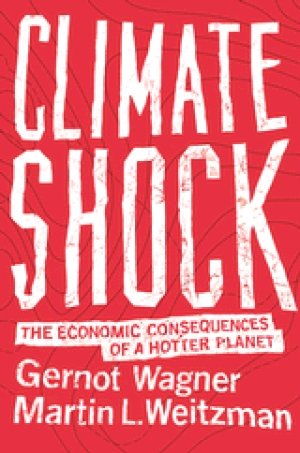Beskrivelse
If you had a 10 percent chance of having a fatal car accident, you'd take necessary precautions. If your finances had a 10 percent chance of suffering a severe loss, you'd reevaluate your assets. So if we know the world is warming and there's a 10 percent chance this might eventually lead to a catastrophe beyond anything we could imagine, why aren't we doing more about climate change right now? We insure our lives against an uncertain future–why not our planet?
In Climate Shock, Gernot Wagner and Martin Weitzman explore in lively, clear terms the likely repercussions of a hotter planet, drawing on and expanding from work previously unavailable to general audiences. They show that the longer we wait to act, the more likely an extreme event will happen. A city might go underwater. A rogue nation might shoot particles into the Earth's atmosphere, geoengineering cooler temperatures. Zeroing in on the unknown extreme risks that may yet dwarf all else, the authors look at how economic forces that make sensible climate policies difficult to enact, make radical would-be fixes like geoengineering all the more probable. What we know about climate change is alarming enough. What we don't know about the extreme risks could be far more dangerous. Wagner and Weitzman help readers understand that we need to think about climate change in the same way that we think about insurance–as a risk management problem, only here on a global scale.
Demonstrating that climate change can and should be dealt with–and what could happen if we don't do so–Climate Shock tackles the defining environmental and public policy issue of our time.
Gernot Wagner is lead senior economist at the Environmental Defense Fund. He is the author of But Will the Planet Notice? (Hill & Wang). Martin L. Weitzman is professor of economics at Harvard University. His books include Income, Wealth, and the Maximum Principle. For more, see www.gwagner.com and scholar.harvard.edu/weitzman.
"[Climate Shock] is a witty, far-ranging, and literate set of observations…[I]t is always informed by a deep understanding of the complexities of economics and particularly the difficulties of reaching international environmental agreements."–William D. Nordhaus, New York Review of Books
"'Top 10: Business & Economics' for Spring 2015."—Publishers Weekly
"Economists Gernot Wagner and Martin Weitzman deliver a high-voltage shock in their analysis of the costs of climate change."—Nature
"[U]seful for policy workers in helping shape dollars-and-cents arguments about the environment and global climate."—Kirkus
"[A]n impressive (and concise) book."–Diane Coyle, Enlightened Economist
"This informative, convincing, and easily read book offers general audiences the basic case for global climate mitigation."–Ian Parry, Finance & Development
"This book represents a synthesis of research and offers a clear-headed look at what must be done."—Toronto Star
"Climate Shock is refreshing in many ways: it starts with a pop quiz, reveals the script of a (possible) new James Bond film and gives you the solution to climate change on page 23. That should be enough to entice a broad readership. However, the book's true value lies elsewhere, in the authors' ability to present a complex and multifaceted topic in plain, simple terms. They challenge assumptions and don't shy away from a clear call for action."–Swenja Surminski, Times Higher Education
"For the intelligent lay reader wanting a lively, lucid assessment of the economic consequences of global warming. . . . [W]ell worth reading."–Pilita Clark, Financial Times
"[Climate Shock] combines sophisticated analysis with a breezy, informal style."— Foreign Affairs




